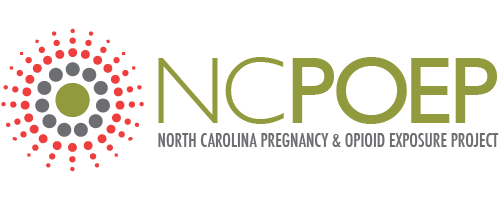The following listing and map provide a range of services that have been found to be useful for women who are pregnant and taking opioids. Each service is explained, and a search can be done by county location. An example of use may be a provider generating a listing of referrals for a woman in a particular county. The services listed are periodically updated and are not exhaustive.
| Types of Service: Care Management for At-Risk Children (CMARC) CMARC is a public health program that serves children from birth to five years of age who meet certain risk criteria, including opioid exposed pregnancy. The main goal of the program is to improve health outcomes working with families. The CMARC Program is a partnership between the NC Division of Public Health (DPH) and the NC Division of Health Benefits (DHB). Care Management for High-Risk Pregnancy Care Management services are available to pregnant women enrolled in North Carolina Medicaid statewide, and to a limited number of low-income, uninsured pregnant women in some counties. Care Managers are registered nurses or social workers who will work with women and their prenatal care providers to ensure they receive the best possible care while pregnant and after delivery. Home Visiting Programs Home visiting programs for pregnant women and families with young children offer information, guidance, risk assessment, and parenting support at home. The programs are evidence-based models that are designed to improve child health and development, pregnancy outcomes, and parenting skills. There are four evidence-based home visiting models offered in NC:
Labor & Delivery Hospital The hospital birth setting offers a safe environment with access to a range of physicians, medical staff, and medical technology when needed. Medication for Opioid Use Disorder (MOUD) Treatment Opioid treatment programs offer medication assisted treatment (MAT) also known as medication for opioid use disorders (MOUD). Methadone and/or Buprenorphine are listed, indicating what medication the program offers as part of their treatment services. Medication for Opioid Use Disorder treatment during pregnancy for women struggling with an opioid use disorder has been shown to have better birth outcomes, including full term births and better birth weights, compared to stopping or tapering opioids. These medications are most effective when part of comprehensive substance use disorder treatment services. (see Perinatal Substance Use Disorder (SUD) Treatment below). Perinatal Substance Use Disorder (SUD) Treatment Substance use disorder services that are designed for women, including those who are pregnant, postpartum, parenting or seeking reunification with their children. These programs are available to women regardless of income or county of residence. Services range from outpatient care to long-term residential programs. These are cross-area service programs, meaning that women living in any county are eligible to go to a program in any other county if she meets treatment criteria. The programs include or arrange for these components: substance-use disorder treatment, case management, life skills training, parenting education, child care services, and transportation services. Pregnancy Medical Home/Prenatal Care The goal of the Pregnancy Medical Home model is to improve birth outcomes through coordinated, evidence-based prenatal care management with a focus on quality improvement for pregnant women insured with Medicaid. Prenatal practices that have signed on to become a ‘Pregnancy Medical Home’ receive coordination support from Community Care of North Carolina’s physician champions and nurse coordinators. Prenatal care, including physical health check-ups and monitoring of pregnancy progress and health indicators, contribute to healthier birth outcomes. Prenatal care providers listed here provide care for women insured with Medicaid or who are uninsured. They may also provide care for privately insured women which insurance providers should be able to confirm. |



